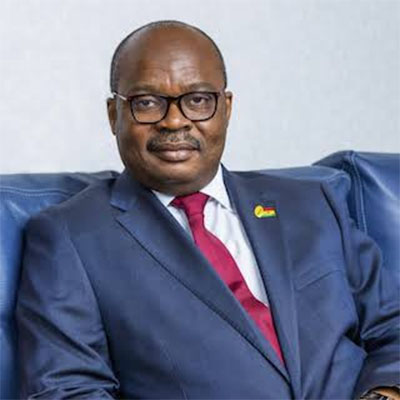Dr. Ernest Addison
The Governor of the Bank of Ghana (BoG), Dr Ernest Addison, has stated that the impact of Coronavirus on emerging markets and low-income countries has been particularly severe.
He made this known in the IMF/World Bank Annual Meetings Plenary Speeches on Thursday, October 15, 2020.
Speaking as the Chairman of the Board of Governors of IMF/World Bank Member States, he said
“Social distancing and lockdown of cities have come at an economic cost – an unavoidable trade-off.”
According to him, “COVID-19 is first and foremost a human tragedy that is causing immense loss of lives and disruption across our membership. My deep condolences to those who have lost loved ones, and best wishes to everyone affected by the virus.”
He stated that “though the pandemic has evolved more slowly than in other parts of the world, many of these economies have been affected by spillovers from weaker global demand, lower commodity prices, and a drop in tourism, with a disproportionate impact on low-skilled workers and those employed in the informal sector, potentially pushing families back into poverty.”
While lockdowns and containment measures can be effective in stopping the spread of the virus, he stated that due to food insecurity in several developing countries, many households risk going hungry if a lockdown lasts more than two weeks.
“This can lead to malnutrition and worsened health outcomes. In addition, widespread school closures and lack of internet access for remote learning, risk leading to a significant loss of learning and human capital, and can reduce lifetime earnings for children in low-income countries. Many of these children, particularly girls, are not likely to return to school after the pandemic.”
“Policymakers have been quick to respond to the crisis. In Ghana for example, we have implemented a range of public health and socioeconomic measures, such as using drones to deliver samples for testing and delivery of essential services, supporting front- line health workers, covering the cost for testing and treatment, and providing economic relief to citizens and enterprises, including offering food assistance and free utility services.”
“Countries’ additional COVID-related fiscal spending has led to higher financing requirements. For many emerging market and developing countries, the crisis has triggered urgent liquidity pressures. The Fund and the Bank have responded swiftly and at scale, helping countries strengthen their pandemic response and health care systems.”
“The Fund doubled access to its emergency financing facilities and has provided financial assistance to over 80 countries. It has also provided grant-based debt service relief through the Catastrophe Containment and Relief Trust.”
“The Bank is providing up to 160 billion dollars in financing tailored to the health, economic, and social shocks countries are facing. Emergency operations to fight the pandemic have reached 100 developing countries. Fast track facilities were rolled out to ensure swift and broad support to help countries deal with their immediate health emergency needs. The Bank is also a strong advocate for equitable access to any COVID-19 vaccine, which will be especially critical for the poorest countries.”
“As an important complement to the emergency financing provided by the Fund and the Bank, the G20 Debt Service Suspension Initiative (DSSI) has provided temporary suspension of bilateral debt service payments to 43 countries.”
“I am proud to see that the international community has risen to meet this daunting global challenge with global solutions. But this is not yet the moment to look back. The crisis is not over, and the pandemic continues to take a significant toll, as more people have slipped into poverty and inequality has worsened, particularly among women and children who have been the hardest hit. The role of the Bretton Woods institutions in galvanizing global attention and support, particularly for the most vulnerable, is commendable. But there is still room to better address the needs of all members.”
“We are facing the prospect of years of poverty reduction and economic progress being reversed by the pandemic. The shock waves from the COVID-19 crisis could lead to a lost decade for the world’s poorest countries unless they receive urgent help and financial assistance.
Fellow Governors, the time to act is now.”
“We need to enact policies that protect recent hard-won human capital gains and prevent long-term damage to the poorer and vulnerable segments of our societies. We also need continued support from the international community to avoid this health crisis becoming a humanitarian crisis.
As we move out of firefighting mode, we should think about the type of post-COVID world we want to shape. We need a recovery that is people-centred, sustainable, and fair.
The COVID-19 pandemic has taught us that a virus knows no borders – we are all in this together, and the global financial safety net is only as strong as its weakest link. But we also know that multilateral cooperation can provide a response of unparalleled reach. The Fund and the Bank membership has shown that we can come together and act when needed.”
“It is important that we keep this momentum as we discuss our shared challenges and joint solutions for global health, economic prosperity, and equality over the coming days.
I commend the IMF and the World Bank Group for once again showing their strong commitment to global economic cooperation and bringing us together by arranging the virtual 2020 Annual Meetings.”
By Melvin Tarlue


